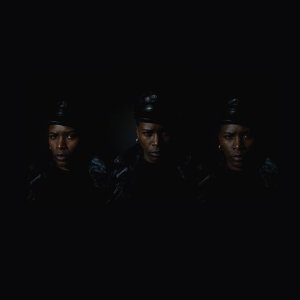It’s been three years since Shannon Funchess and Bruno Coviello formed their synthpop project Light Asylum, and just under three years since fellow New Yorkers Cold Cave released Love Comes Close. Largely owing to that album’s success, obscure 80s subgenres like coldwave and minimal synth are enjoying something of a revival. But this trend has deeper roots. For the better part of the last decade, lovingly-curated American labels like Minimal Wave, Wierd, and Dark Entries have nurtured a self-contained scene of austere synth music and gothic post-punk. Like Cold Cave, Light Asylum have a complicated relationship to this old-school underground. On their debut album, they draw on New York’s frigid ferment while looking towards a much broader audience.
Light Asylum immediately set themselves apart from the esoteric aura of their 80s-inspired peers by embracing a bright, spacious, relatively poppy sound. While Xeno and Oaklander spend their days digging through vinyl obscurities from France and Belgium, and Trust deftly modernize the warped sounds of vintage Euro-disco, Light Asylum look to more mainstream sources like New Order, Depeche Mode, and even Yazoo. At their best, Light Asylum pull it off. On the ballad ‘Shallow Tears’, for instance, they pay skillful homage to early New Order. Funchess imbues her bellow with operatic grandeur, nailing that elusive "last dance at Goth Prom" feeling.
Despite such moments of pure pop, Light Asylum are most convincing when they embrace their latent industrial tendencies. ‘At Will’ sounds like Trent Reznor raging out to early Detroit techno, and might disconcert some listeners with its stripped-down assault. ‘IPC’ – the album’s strongest track – resounds with fanatic chanting and courses with muscular tension, channeling the power of Nitzer Ebb and Front 242 without sacrificing melody. Here, Funchess spits out clipped imprecations over Coviello’s propulsive beat. "You get 25 to life, waiting for a train in my city" she snarls, "25 to life, smoking marijuana in my city." It’s a scathing, spot-on critique of life under Bloomberg and Giuliani’s post-9/11 public safety regime.
Even on ‘IPC’, however, it’s clear that this band has focused too much on referencing and too little on songwriting. Listen to the first chorus, where Coviello spins an intricate web of intertwined synth riffage. The song’s catchiness hinges on what he does here, and how he develops it later on. But with its frantic minor-scale runs and processed 8-bit tones, it sounds naggingly familiar-it could be an outtake from a Crystal Castles session.
Moreover, the fact that one of Light Asylum‘s strongest moments so closely references a contemporary band bodes ill for the overall writing. ‘Pope Will Roll’ and ‘Heart of Dust’, for instance, are potential bangers mired in mediocrity. They’re built around stammering two-note synth pulses that yield neither melody nor groove, instead pushing a kind of sing-song catchiness through pure insistence. Funchess’ vocal lines stay close to root notes and standard rhythms, neither drawing the ear nor stirring the body. On ‘End of Days’ this flat phrasing prevents Light Asylum from conjuring a suitably apocalyptic atmosphere, and directs unflattering attention to the lyrics.
‘Angel Tongue’, however, is Light Asylum’s perfect storm. Here, ill-formed melodies collide with truly cringe-inducing romantic lyrics. "If I gave you the key to my heart," Funchess begins, before declaring: "These words are not tokens, these words are sincere: It’s always nice to see you… around." Well, isn’t that nice. Emotionally-charged platitudes can speak volumes in the context of a real-life romantic relationship, but in music, as in all art, mere sincerity isn’t enough. Perhaps Light Asylum could redeem even these words with a yearning instrumental backdrop, but that’s not here either. The synths chime with all the sunny charm of an ironic kickball game uploaded to Instagram, and the vocal part locks into a single repeating New Order melody until the chorus, where it dutifully becomes a little different, before becoming the same again. Bernard Sumner and company knew how to wring profundity from the seemingly banal, but Light Asylum have yet to master this craft.


